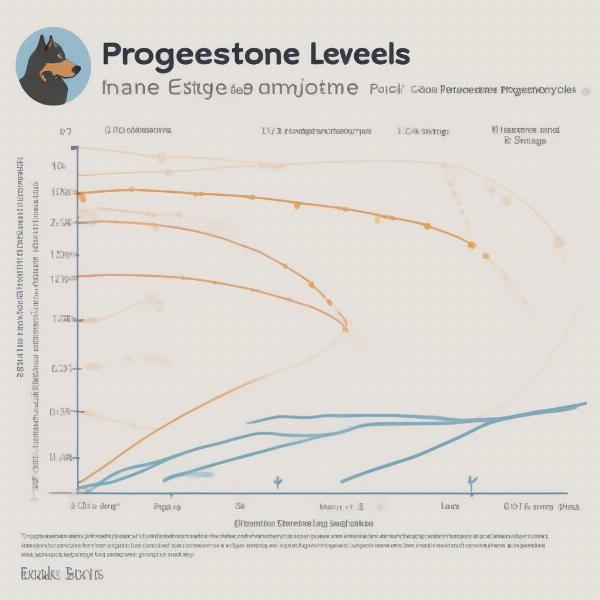Progesterone testing kits for dogs are essential tools for breeders looking to pinpoint the optimal time for mating. Understanding the canine estrus cycle and the role of progesterone can significantly increase the chances of a successful pregnancy. This article will delve into the importance of progesterone testing, the different types of tests available, how to interpret the results, and answer some frequently asked questions.
Understanding the Canine Estrous Cycle and the Role of Progesterone
A dog’s reproductive cycle, also known as the estrus cycle, involves fluctuating hormone levels that prepare the body for potential pregnancy. Progesterone, a hormone produced by the ovaries, plays a crucial role in maintaining pregnancy. Its levels rise and fall during the cycle, with a significant surge occurring around ovulation. This is the prime time for breeding. Accurately determining this fertile period is where progesterone testing comes into play. By monitoring progesterone levels, breeders can time mating precisely to maximize the chances of conception.
Types of Progesterone Tests for Dogs
Several types of progesterone tests are available, each with its own advantages and disadvantages. In-house tests, often referred to as rapid tests, offer convenience and quick results. These tests use a blood sample and provide an indication of progesterone levels within minutes. Laboratory testing, on the other hand, offers higher accuracy but requires sending the blood sample to a veterinary lab and waiting for the results. dog progesterone test kit Some breeders opt for a combination of both methods, starting with in-house testing and confirming with laboratory analysis when progesterone levels reach a certain threshold. The best choice depends on individual needs, budget, and access to veterinary services.
Interpreting Progesterone Test Results
Understanding how to interpret progesterone test results is crucial for successful breeding. Results are typically measured in nanograms per milliliter (ng/ml). The optimal breeding time usually corresponds to progesterone levels between 5 and 10 ng/ml. However, individual variations exist, and consulting with a veterinarian specializing in canine reproduction is highly recommended. They can help interpret the results in the context of the specific dog’s breed, age, and overall health.
 Interpreting Dog Progesterone Test Results
Interpreting Dog Progesterone Test Results
How to Use a Progesterone Testing Kit for Dogs
Using an at-home progesterone testing kit is relatively straightforward. progesterone test for dogs at home It typically involves collecting a small blood sample from the dog, usually from the ear vein or lip. The blood is then placed on a test strip or mixed with a reagent, depending on the specific kit. Following the instructions carefully is essential to ensure accurate results.
Tips for Successful Breeding
While progesterone testing is a valuable tool, successful breeding requires more than just timing. Ensuring both the male and female are healthy, providing proper nutrition, and creating a stress-free environment are equally important. at home progesterone test for dogs Consulting with a veterinarian throughout the breeding process can significantly improve the chances of a successful and healthy litter. whelping calendar for dogs Furthermore, considering artificial insemination can be a valuable option in certain situations. artificial insemination for dogs kit
Conclusion
Progesterone testing kits for dogs are indispensable tools for breeders seeking to optimize breeding timing and increase the likelihood of a successful pregnancy. By understanding the canine estrus cycle, the role of progesterone, and the different testing options available, breeders can make informed decisions and contribute to the responsible breeding of healthy puppies.
FAQ
- What is the best time to breed a dog? The optimal breeding time is typically when progesterone levels are between 5 and 10 ng/ml.
- How often should I test progesterone levels? Testing every 2-3 days during the estrus cycle is often recommended.
- Are in-house progesterone tests accurate? In-house tests can provide a good indication, but laboratory testing offers higher accuracy.
- Can I use a human progesterone test on my dog? No, human progesterone tests are not suitable for dogs.
- What other factors contribute to successful breeding? Overall health, nutrition, and a stress-free environment are crucial.
- When should I consult a veterinarian? Consulting a veterinarian throughout the breeding process is highly recommended.
- Where can I purchase a progesterone testing kit for dogs? Progesterone testing kits can be purchased online or from veterinary clinics.
ILM Dog is your trusted resource for expert dog care advice and information. We cover everything from breed selection and health to training, nutrition, and grooming. Our goal is to empower dog owners worldwide with the knowledge and resources they need to provide the best possible care for their canine companions. Whether you’re a seasoned dog owner or just starting out, ILM Dog has the information you need. Contact us today for expert advice and support. Email: [email protected], Phone: +44 20-3965-8624 or visit our website ILM Dog.